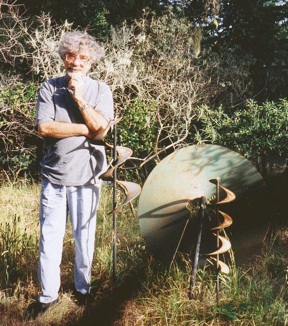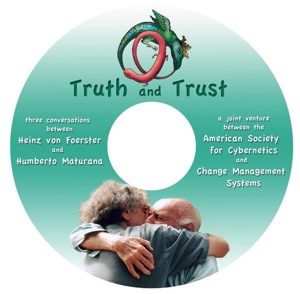truth and trust


history of a video
Maturana worked with Heinz von Foerster in the Biological Computer Lab (BCL) in the late 60’s. They became friends, and when Humberto many years later worked in California, he used to spend weekends visiting Heinz at his home near Pescadero. There are many anecdotes that can be told of their years together, here I will only mention that they played together ... with ideas and with building things. Indeed Heinz’s wife, Mai, used to say when she saw Humberto arriving “Here comes your playmate!”
In 1998 Heinz was starting to ail, and the two had not seen each other for several years. I wanted to bring them together once more, and conceived of a project to produce a video for the American Society for Cybernetics (of which I was then President) of the two having a series of conversations. A colleague and friend in California, Barb Vogl, joined the endeavour with local resources and with the blessing of the ASC we invited Humberto to come from Chile to visit Heinz, and we produced the video. Heinz was in fact in the local hospital at the time, but there was a nice courtyard, and we filmed for less than an hour each day.


Humberto visiting Heinz’ garden at the time of the videotaping sessions.
He is standing by a sculpture he made as part of their “playing together”.
friend
The completed video is in three parts, each of the half hour segments is a complete, unedited representation of the conversations held on each of the three visits.
-
2.Future to be Determined (about Education)
You can click on any of the above titles for a link to the original half hour episodes.
the problem of truth
In this video segment Heinz claims that the origin of the German word for “truth” (Wahrheit) comes from the Latin root vertias, which we in English use in terms such as verification. The English word “truth” is based on the notion of trust - possibly via the Proto-Germanic root treuwaz for belief and faithfulness.
The main topic of the conversation, however, is about how can we ever claim that something is true, as the standard notion is that we need to make reference to something that is external to us. What comes out of the conversation for me is that what we can claim as “truth” is a matter of the rules we have given ourselves for discovering what truth is. This is not a problem, as we can act collaboratively with each other, trusting the use of these rules or procedures, as they do give us consistent results. Thus, the possibility of verification is conserved in how we explain.
